英语笔译:文学文本的翻译共34页
- 格式:ppt
- 大小:3.96 MB
- 文档页数:34
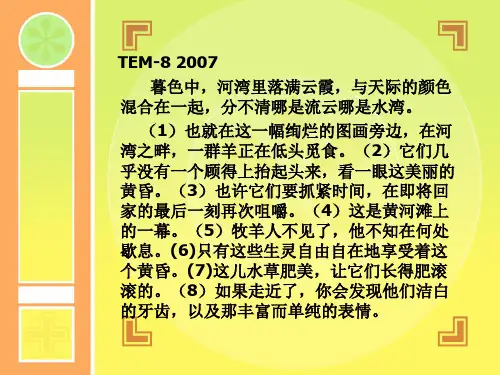

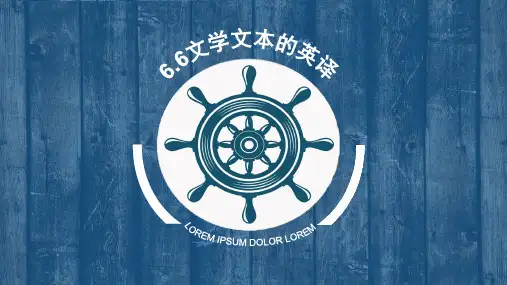
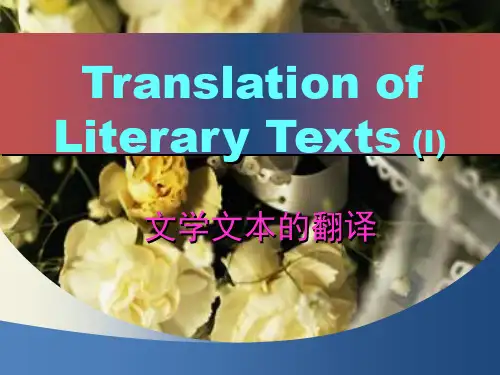
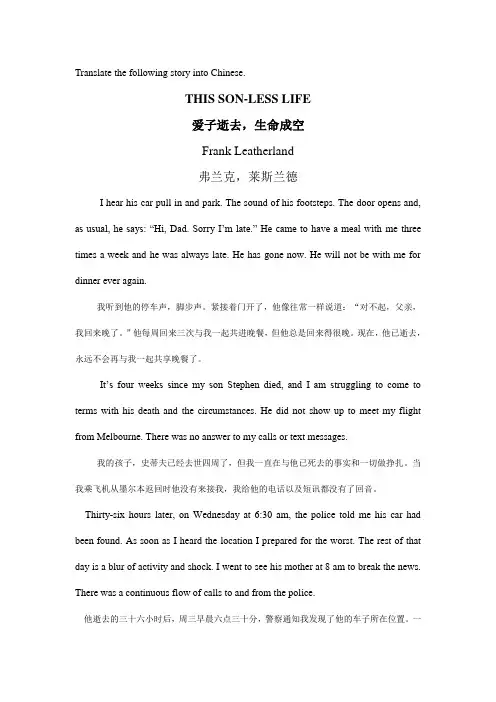
Translate the following story into Chinese.THIS SON-LESS LIFE爱子逝去,生命成空Frank Leatherland弗兰克,莱斯兰德I hear his car pull in and park. The sound of his footsteps. The door opens and, as usual, he says: “Hi, Dad. Sorry I’m late.” He came to have a meal with me three times a week and he was always late. He has gone now. He will not be with me for dinner ever again.我听到他的停车声,脚步声。
紧接着门开了,他像往常一样说道:“对不起,父亲,我回来晚了。
”他每周回来三次与我一起共进晚餐,但他总是回来得很晚。
现在,他已逝去,永远不会再与我一起共享晚餐了。
It’s four weeks since my son Stephen died, and I am s truggling to come to terms with his death and the circumstances. He did not show up to meet my flight from Melbourne. There was no answer to my calls or text messages.我的孩子,史蒂夫已经去世四周了,但我一直在与他已死去的事实和一切做挣扎。
当我乘飞机从墨尔本返回时他没有来接我,我给他的电话以及短讯都没有了回音。
Thirty-six hours later, on Wednesday at 6:30 am, the police told me his car had been found. As soon as I heard the location I prepared for the worst. The rest of that day is a blur of activity and shock. I went to see his mother at 8 am to break the news. There was a continuous flow of calls to and from the police.他逝去的三十六小时后,周三早晨六点三十分,警察通知我发现了他的车子所在位置。
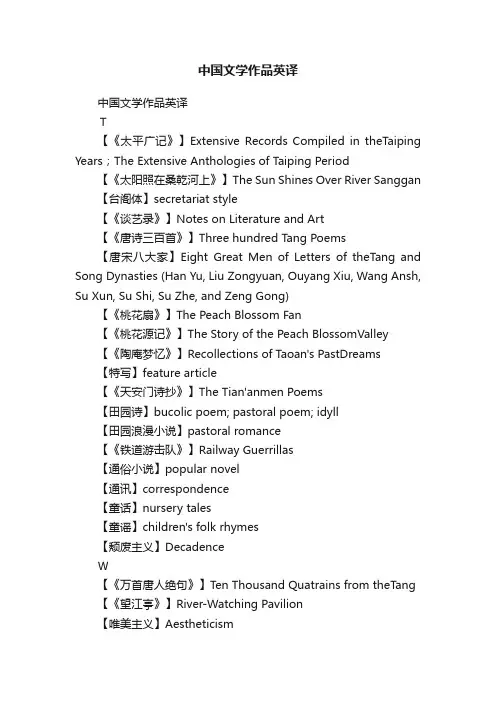
中国文学作品英译中国文学作品英译T【《太平广记》】Extensive Records Compiled in theTaiping Years;The Extensive Anthologies of Taiping Period【《太阳照在桑乾河上》】The Sun Shines Over River Sanggan 【台阁体】secretariat style【《谈艺录》】Notes on Literature and Art【《唐诗三百首》】Three hundred Tang Poems【唐宋八大家】Eight Great Men of Letters of theTang and Song Dynasties (Han Yu, Liu Zongyuan, Ouyang Xiu, Wang Ansh, Su Xun, Su Shi, Su Zhe, and Zeng Gong)【《桃花扇》】The Peach Blossom Fan【《桃花源记》】The Story of the Peach BlossomValley【《陶庵梦忆》】Recollections of Taoan's PastDreams【特写】feature article【《天安门诗抄》】The Tian'anmen Poems【田园诗】bucolic poem; pastoral poem; idyll【田园浪漫小说】pastoral romance【《铁道游击队》】Railway Guerrillas【通俗小说】popular novel【通讯】correspondence【童话】nursery tales【童谣】children's folk rhymes【颓废主义】DecadenceW【《万首唐人绝句》】Ten Thousand Quatrains from theT ang 【《望江亭》】River-Watching Pavilion【唯美主义】Aestheticism【唯物史观】materialistic conception ofhistory【《围城》】A Town Besieged【为艺术而艺术】art for art sake【为人生而艺术】art for life's sake【《伪自由书》】False Liberty【文笔】style of writing【文化遗产】cultural heritage【文人墨客】poets and literary men【《文心雕龙》】Carving a Dragon at the Core ofLiterature 【《文选》】The selections of RefinedLiterature【文学革命】literature revolution【文学批评史】history of literary critiques【文学社会学】sociology in literature【文学史】history of literature【文学思想史】history of literary thought【文学心理学】psychology in literature【文学研究会】the Society for Literary Research【文学遗产】literary heritage【文艺创作】literary and artistic creation【文艺队伍】ranks of writers and artists【文艺革命】revolution in literature and art【文艺工作者】literary and art workers【文艺民俗学】folklore in literature【文艺批评】literary and art criticism【文言】classical Chinese【文言文】writings in classical Chinese【《文苑英华》】Wenyuan Yinghua; Best LiteraryWorks 【问题小说】problem novel【五经】The Five Classics【五言诗】a poem with five characters in aline【无产阶级文学】proletarican literature【无产阶级小说】proletarian novel【无题诗】untitled poems【吴中四杰】Four Outstanding Men of Wu ( thefour renowned young poets of the early Ming, namely , Gao Qi, Zhang Yu, Yu Ben and Jang Ji )【武侠小说】chivalry novel and novelettes;gongfu novel【《雾》】FogX【西方马克思主义文艺批评】Western Marxist criticism【《西湖佳话》】Memorable Stories of the West Lake【《西厢记》】West Chamber; The Western Chamber【《西游记》】Pilgrimage to the West; Monkey;Story of a Journey to the West; Records of a Journey to the West 【戏剧冲突】dramatic conflict【戏剧性手法】the dramatic method【《闲情偶寄》】Sketches of Idle Pleasure【险韵】obscure rhymes【现代文学】contemporary literature【现代戏剧】modern drama【现代主义与后现代主义】modernism and post-modernism 【现实主义小说】realistic novel【乡村小说】rural novel【乡土文学】local literature; nativeliterature【象征派诗】Symoblist poetry【《湘西散记》】Recollections of West Hunan【小剧场运动】little theater movement【小品文】familiar essay; essay【小说美学】aesthetics of fiction【《小说月刊》】The Short Story Monthly【小小说】short-short story【消遣小说】light fiction【《笑府》】Treasury of Jokes【笑话】joke【《笑林广记》】Jest Books【楔子】prologue in some modern novels【写光明】writing about the bright【写黑暗】writing about the dark【心理描写】inside description【心理现实主义】psychological realism【心理小说】psychological novel【《新儿女英雄传》】New Story of Heroic Sons andDaughters【新青年】New Youth【新月社】the Crescent Moon Society【形象思维】thinking in terms of images【《醒世恒言》】Lasting Words to Awaken the World;The Common Saying Moralizing People 【《醒世烟缘传》】Marriage that Awakens the World【性的描写】sextual description【性格喜剧】comedy of humours【《性格组合论》】On the Composition of Character【修辞手段】figures of speech【绣像小说】illustrated fiction【叙事诗】narrative poem【叙事小说】narrative novel【序跋】preface and postscript【序幕】prologue; prelude【宣传鼓动剧】agitprop【宣传文学】porpaganda literature【宣传小说】propaganda novel【渲染】apply colours to a drawing; playup【悬念】audience involvement in a film orplay; reader involvement in a piece ofliterature【学院戏剧】academic dramaY【延安文艺座谈会】the Yan'an Forum on Literature andArt【演义】historical novel; historicalrommance【《艳阳天》】Radiant Skies【《阳春白雪》】The Spring Snow【《野草》】Wild Grass【《野叟曝言》】A Rustic's Idle Talk【《易经》】The Book of Changes【艺术标准】artistic criterion【艺术成就】artistic merit【艺术的起源】origin of art【艺术鉴赏】virtuosity【艺术借鉴】reference in art【艺术效果】effect of art【艺术性】artistic quality【艺术至上论】art eorart【《艺文类聚》】Yi Wen Lei Ju; Classified Excerptsfrom Ancient Writers; A Categorized Collection of Literary Writing 【意识流】stream of consciousness【印象主义批评】impressionistic criticism【因材施教】individualized method ofinstruction; case by case【《永乐大典》】Yong Le Da Dian ; GreatEncyclopaedia of the Yongle Reign; The Great Encyclopaedia in the Reign of EmperorYongle【用民族风格表现新的内容】presenting new ideological contentwith a national style 【语义重叠】multiple meaning 【《喻世明言》】Illustrious Words to Instruct theWorld【寓教于乐】delight and instruction【寓言故事】fable【元曲】Yuan verse【元杂剧】Yuan-Dynasty zaju plays【原型批评】archetypal criticism【圆形人物】round character【鸳鸯蝴蝶派】Mandarin Duck and ButterflySchool; Love Birds and Butterfly School 【乐府】folk rhyme; folk songs and balladsin the Han style【《乐府诗集》】The Collection of Folk Songs andBallads in the Han Style【《岳阳楼记》】On Yueyang Tower【《阅微草堂笔记》】Jottings from the Thatched Abodeof Close ObservationsZ【杂剧】zaju (poetic drama set to music,flourishing in the Yuan Dynasty, usu. consisting of four acts called zhe, with a character having the singing role ineach zhe )【《在延安文艺座谈会上的讲话》】Talks at the Yan'an Forum ofLiterature and Art 【《再别康桥》】Saying Good-bye to Cambridge Again【《战国策》】Strategies of the Warring StatesPeriod;Intrigues of the Warring States【章回小说】Traditional Chinese novels (witheach chapter headed by a couplet givingthe list of its content)【《朝华夕拾》】Dawn Blossoms Plucked at Dusk【《浙西六家词》】The Ci Poetry by Six Poets fromthe Westen Part of Zhejiang Province 【真相大白的情节或场面】recognition plot or scene【侦探小说】detective story【正面人物】positive character【《正气歌》】A Song of the Moral Sense【政治标准】political criterion【政治和艺术的统一】unity of politics and art【政治小说】political novel【志怪小说】mythical stories【中国诗歌会】the China Poetry Society【《中国俗文学史》】History of Chinese PopularLiterature【《中国通俗小说书目》】A Bibliography of Popular ChineseFiction【《中国文学批评史》】History of Chinese LiteraryCriticism 【中国文学艺术界联合会】All China Federation of Literaryand Art Circles【《中国小说史略》】A Short History of Chinese Fiction【中国左翼作家联盟】China League of Left-Wing Writers【中国作家协会】Association of Chinese Writers【中华全国文学工作者协会】All-China Federation of Writers 【《中庸》】The Doctrine of the Mean【主情文学】literature of sensibility【主题明确】(with) a clear-cut theme【竹枝词】1. ancient folk songs with love astheir main theme2. occasional poems in the classical style devoted to local topics【《庄子》】Zhuang Zi; Book of Master Zhuang【《资治通鉴》】Comprehensive Mirror for AidGovernment 【《子不语》】What the Master Would Not Talk of【《子夜》】Midnight【自我隐退的作者】self-eff【自叙体形式】ich-form【自由恋爱】free love【自由诗】free verse【姊妹篇】companion piece【《组织部来了个年轻人》】A Young Newcomer in theOrganization Department 【《醉翁亭记》】Record of the Old Tippler'sPavalion【《左传》】Zuo Zhuan; Zuo Commentary; MasterZuo's Spring and Autumn Annals 【作品基调】mood and ambience 【作品评价】evaluation of literary works【作品欣赏】appreciation of literature works【《左传》】Zuo Zhuan; Zuo Commentary; MasterZuo's Spring and Autumn Annals 【作品基调】mood and ambience 【作品评价】evaluation of literary works【作品欣赏】appreciation of literature works。
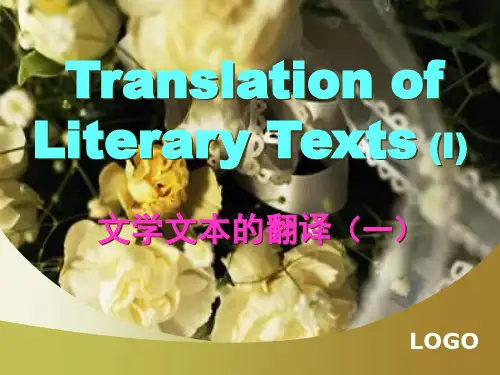
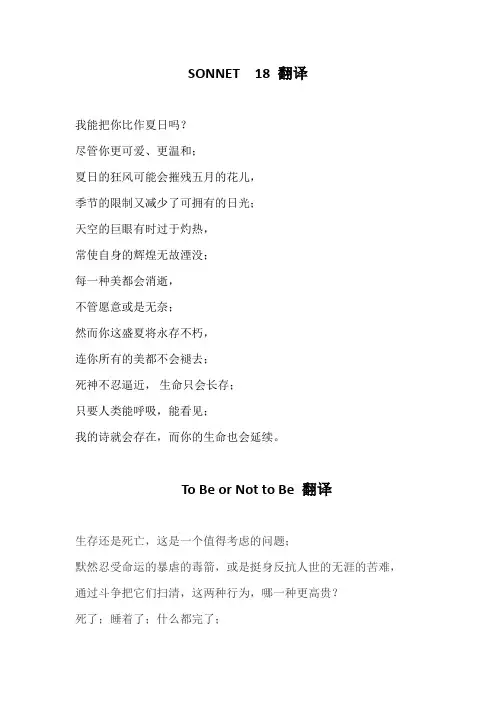
SONNET 18 翻译我能把你比作夏日吗?尽管你更可爱、更温和;夏日的狂风可能会摧残五月的花儿,季节的限制又减少了可拥有的日光;天空的巨眼有时过于灼热,常使自身的辉煌无故湮没;每一种美都会消逝,不管愿意或是无奈;然而你这盛夏将永存不朽,连你所有的美都不会褪去;死神不忍逼近,生命只会长存;只要人类能呼吸,能看见;我的诗就会存在,而你的生命也会延续。
To Be or Not to Be 翻译生存还是死亡,这是一个值得考虑的问题;默然忍受命运的暴虐的毒箭,或是挺身反抗人世的无涯的苦难,通过斗争把它们扫清,这两种行为,哪一种更高贵?死了;睡着了;什么都完了;要是在这一种睡眠之中,我们心头的创痛,以及其他无数血肉之躯所不能避免的打击,都可以从此消失,那正是我们求之不得的结局。
死了;睡着了;睡着了也许还会做梦;嗯,阻碍就在这儿:因为当我们摆脱了这一具朽腐的皮囊以后,在那死的睡眠里,究竟将要做些什么梦,那不能不使我们踌躇顾虑。
人们甘心久困于患难之中,也就是为了这个缘故;谁愿意忍受人世的鞭挞和讥讽、压迫者的凌辱、傲慢者的冷眼、被轻蔑的爱情的惨痛、法律的迁延、官吏的横暴和费尽辛勤所换来的小人的逼视,要是他只要用一柄小小的刀子,就可以清算他自己的一生?谁愿意负着这样的重担,在烦劳的生命的压迫下呻吟流汗,倘不是因为惧怕不可知的死后,惧怕那不曾有一个旅人回来过的神秘之国,是它迷惑了我们的意志,使我们宁愿忍受目前的磨折,不敢向我们所不知道的痛苦飞去?这样,重重的顾虑使我们全变成了懦夫,决心的赤热的光彩,被审慎的思维盖上了一层灰色,伟大的事业在这一种考虑之下,也会逆流而退,失去了行动的意义。
Letter to theRight Honourable The Earl of Chesterfield翻译致切斯菲尔德伯爵书译文一:文言体译文〖中〗辜正坤译注大人阁下:顷得《世界报》馆主告知,该报近日揭载二文,对拙编词典,颇有扬善褒荐之词,闻皆出阁下手笔。
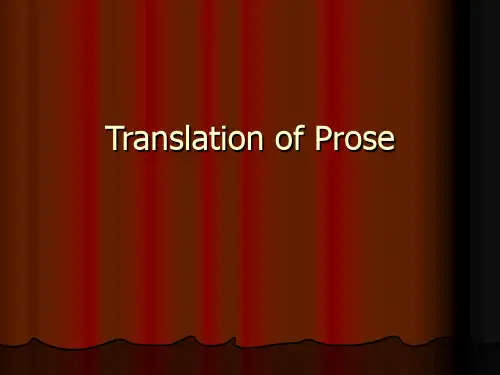
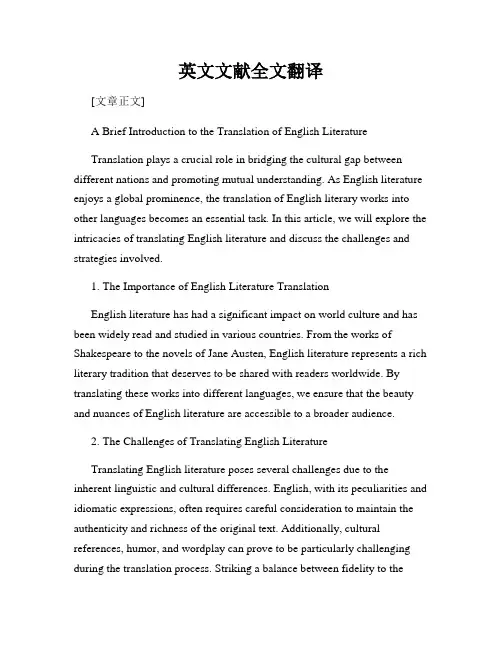
英文文献全文翻译[文章正文]A Brief Introduction to the Translation of English LiteratureTranslation plays a crucial role in bridging the cultural gap between different nations and promoting mutual understanding. As English literature enjoys a global prominence, the translation of English literary works into other languages becomes an essential task. In this article, we will explore the intricacies of translating English literature and discuss the challenges and strategies involved.1. The Importance of English Literature TranslationEnglish literature has had a significant impact on world culture and has been widely read and studied in various countries. From the works of Shakespeare to the novels of Jane Austen, English literature represents a rich literary tradition that deserves to be shared with readers worldwide. By translating these works into different languages, we ensure that the beauty and nuances of English literature are accessible to a broader audience.2. The Challenges of Translating English LiteratureTranslating English literature poses several challenges due to the inherent linguistic and cultural differences. English, with its peculiarities and idiomatic expressions, often requires careful consideration to maintain the authenticity and richness of the original text. Additionally, cultural references, humor, and wordplay can prove to be particularly challenging during the translation process. Striking a balance between fidelity to thesource text and ensuring a seamless reading experience in the target language is no easy task.3. Strategies for Translating English LiteratureTo overcome the challenges mentioned above, translators employ various strategies to ensure accurate and effective translations of English literature. Here are a few key strategies commonly employed:a) Cultural Adaptation: Translators must understand the cultural context of both the source and target languages to ensure that the translation resonates with the target audience. This may involve adapting idioms, references, and jokes to make them relatable and understandable in the target language.b) Style and Tone Consistency: Capturing the style and tone of the original text is vital in preserving the author's voice. Translators need to be mindful of the author's intended tone and ensure consistency throughout the translated work.c) Localization: Certain elements of English literature may need to be localized to resonate with the target culture. This may involve changing names, locations, or even altering certain plot points that may not be relatable or appropriate for the target audience.d) Collaborative Efforts: Translating English literature often involves working closely with authors, editors, and other linguistic experts. Encouraging collaboration can help ensure that the translation accurately reflects the author's intent while also meeting the linguistic and cultural expectations of the target audience.4. The Role of TranslatorsTranslators of English literature have a great responsibility to faithfully convey the emotions, themes, and ideas expressed in the original text. They must possess a deep understanding of both the source and target languages and be skilled in capturing the nuances of the literary work. Through their dedication and expertise, translators enrich the literary world by making English literature accessible to non-English speakers.ConclusionTranslating English literature is undoubtedly a complex task that requires linguistic prowess, cultural understanding, and the ability to capture the essence of the original work. By overcoming the challenges and employing effective translation strategies, translators contribute to the global dissemination of English literature and nurture cross-cultural connections. Their work allows readers around the world to appreciate and engage with the beauty and wisdom of English literary masterpieces.。

Unit 1 黄昏[1]诺曼•格茨比坐在公园的长凳上,背靠一块栽有灌木的狭长草地,草地被公园的栏杆包围着。
隔着宽阔的马车道,对面是伦敦海德公园的跑马场。
紧靠他右边,海德公园的演讲角那边传来嘈杂的车马声。
这是一个三月初的傍晚,大约六点半左右的光景,在月光和众多街灯的照耀下,浓重而柔和的暮色笼罩了一切。
马路以及人行道上空无一人,然而黯淡的光线底下却有许多不起眼的身影在悄悄地活动,或者三三两两地坐在长凳和椅子上,简直难以将他们从周围的暗处分辨出来。
[2]这一情景让格茨比心旷神怡,也颇符合他此时的心境。
在他心目中,黄昏是失意者的时刻。
那些经历了奋斗和失败的男男女女们,在这夜幕降临的时刻纷纷出来活动。
他们尽可能掩饰自己没落的命运和破灭的希望,以躲避好奇者的详细探究。
他们衣衫褴褛,双肩佝偻,神色黯然,而这个时刻不会有人注意他们,至少不会被人认出来。
[3]亡国之君必将遭遇奇异目光,心痛的滋味如此苦涩。
[4]那些徘徊在暮色中的人们不愿受到奇异目光的注视,因此才在这蝙蝠活动的时刻出得门来,在游乐园的正当游客散尽之后前来寻找一点可怜的乐子。
在由灌木和栅栏形成的屏障那边,是另一个亮如白昼、车水马龙的世界。
黄昏中的万家灯火几乎驱散了夜幕,照亮了那些另一些人们常去的地方。
他们在人生的搏斗中站稳了脚跟,至少还没到承认失败的那一刻。
在这空荡荡的路边,格茨比坐在长凳上不禁浮想联翩。
他沉浸在自己的思绪中,把自己也归入失意者的行列。
其实格茨比并无衣食之虞;只要他愿意,他完全可以信步走到那些灯火通明、熙来攘往的大街上,在那些享受荣华富贵以及为之而彼此倾轧的人们中找到属于自己的位子。
他的抱负更为微妙,但是他失败了。
此刻他感到伤心和幻灭,便带着嘲弄的心情观察起那些同他一样,在街灯照射不到的阴暗处徘徊的人们,将他们分门别类以便从中得些乐趣。
[5]在他身边,有位老人和他坐在同一条长凳上。
这位老人身上有一种已趋消沉的桀骜不逊的气质,这种气质恐怕已只是一个不再对任何人或事构成挑战的人身上一点自尊的残余而已。
1. 句子翻译1) The warm spring attracts us with her resplendent beauty dazzling in haze, and nature provides us with scenery of splendor and charm. Gathered in this fragrant garden full of peach and plum flowers in blossom, we talk to our hearts’ content about family love and happiness. (请用文言文翻译)良春慰我以烟景,大块假我以文章,聚桃李之芳园,叙天伦之乐事。
2) To be content with simple living is a part of early education. A child making preferences in food or clothes will be scorned and beaten. If a mother lets her child develop special tastes in food, she will be criticized as indulging her child.知足是早期教育的一部分。
对食物和衣服表现出偏好的孩子会受到责罚。
孩子挑食,母亲会被指责放纵孩子。
3) The attitude of the parents and elder relatives towards children must be understood in relation to these factors—the need for population control due to economic pressure, the small number of children, the high infant mortality, the belief in spirit sadism, the desire for posterity and the connected religious and ethical ideas. As a result of these factors, we can see that the children who survive are highly valued, even though there is an outward show of indifference.要理解父辈乃至更老一辈对于儿女的态度,就不能忽略经济压力下的人口控制、孩童的较低人数、婴幼儿的高死亡率、悲观主义思想、传宗接代的渴望和相关宗教、道德思想。
文学翻译:1.《柳家大院》(节选)原文作者:老舍这两天我们大院里又透着热闹,出了人命。
事情可不能由这儿说起,得打头来。
先交代我自己吧。
我是个算命的先生,我也卖过酸枣、落花生什么的。
那可是先前的事了。
现在我在街上摆卦摊儿;好了呢,一天也抓弄三毛五毛的。
老伴儿早死啦,儿子拉洋车。
我们爷儿俩住着柳家大院的一间北房。
除了我这间北房,大院里还有二十多间房呢。
一共住着多少家子,谁说得清?住两间房的就不多,又搭上今儿个搬来,明儿个又搬来,我没那么好的记性。
大家见面,招呼声“吃了吗?”透着和气,不说呢,也没什么。
大家一天到晚为嘴奔命,没有工夫扯闲盘儿。
爱说话的自然也有。
可得先吃饱啦。
王家住两间房。
老王和我算是柳家大院最“文明”的人了。
“文明”是三孙子。
2.《柳家大院》(节选)译文A prettykick-up has been the order of the day again in our compoun d lately, for a life has been lost.Butthisisn’tthewaytoopentheball. We shouldgo the whole animal.First , a few words about myself.I’mafortune-teller. Once I was a venderof sour dates , ground-nuts and what not. But that was ages ago. Now I keep a fortune-teller’sstallontheside-walk and can scrapeup three or five dimes a day at best. My old gal had long kickedup her heels. Myson’saricksha w-boy. That’swhathe’s. We two , fatherand son , hang our hats at a south-facingroom in the Liu’scompoun d.Besides the room we occupythere are twentymore rooms in the same compoun d. How many familie s live there , only God knows. Those who occupytwo rooms are quite few. Besides , they are alwaysonthego.Ihaven’tgotsuchagoodmemor yas to remembe r all that. When peoplemeet , theygreeteachotherwitha“Howdoyoudo?”, just to show their good neighbo urly feeling s. But if they shouldcut each other dead , nobodywould care. Whenone’sknocked about from pillarto post for his bread day in and day out , hewon’tfindgingerenoughfor gas and gaiters. Of course, there’sthosewhoarealljawlikeasheep’sheadamongus. But one can hardlybe in a mood for rag-chewingwhenone’sgutscrycupboar d .The Wang familyoccupie s two rooms. Old Wang and I are conside red the genteel fork in the compoun d. Gentili ty be hanged!注释:kick-up:有了问题,出了毛病open the ball:作为开头what not:诸如此类的东西old gal:(口)老伴kickedupone’sheels:(俚) 死ricksha w :人力车,黄包车hangone’shatson:指望,依靠on the go:(口)忙个不停cut sb. dead:不理睬某人knock about :(口)漂泊,游荡from pillarto post :四处奔走着,到处碰壁地,for his bread (俚) =for his moneyday in and day out :日复一日,每天不间断地ginger:(口)精力,活力,劲头gas :(俚)令人非常满意(或愉快的)的事(或人)bealljaw(likeasheep’shead):全是空话,废话连篇rag :(俚)姑娘,情人(指女性)guts:(用作单)贪食者be hanged:(用于诅咒语中)不得好死3.原文言语风格分析老舍先生是善于运用群众的言语大师。
英译汉(文学翻译)The work Joyce produced in Portrait of the Artist, his Kunstlerroman, his formative novel, is not without ambivalence. In one of the first scenes, he who will become the artist is in open opposition to the law and to authority. We have to look at the word "law" and render it more flexible. We have to analyze who lays down the law and who is in the law's place. In this respect, there is a difference between Joyce and Kafka. In Kafka, the law is not figured by anyone. In Joyce there are specific authorities. In the first page of his novel, the women threaten him with castration but, as in Clarice Lispector, the question of the father is important too. In Clarice's "Sunday, before falling asleep," the father is really a father/mother and everything is organized in the direction of the father. Genesis takes place in a maternal and paternal mode of production. In Joyce, something analogous is related to the very possibility of the formation of the artist. Which father produces the artist? The question is related to the superego. Yet it is not always the same self that has a repressive figure.The first two pages of Portrait of the Artist can be approached through a kind of multiple reading, which is what Joycean writing asks for. We read word for word, line by line, but at the same time it has to be read —because that is how it is written —as a kind of embryonic scene. The entire book is contained in the first pages, which constitute a nuclear passage. The ensemble of Joyce's work is here like an egg or an opaque shell of calcium. An innocent reading will lead us to believe that these pages are hermetic. One understands everything and nothing; everything because there is really nothing obscure, nothing because there are many referents. Perhaps Irish people would find it more accessible, at least if they know their history well. Here, we have something of a coup d'ecriture, with many signs of the ruse of the artist. The text is presented in an apparent naivete —like Clarice's "Sunday, before falling asleep"— but nothing is more condensed, or more allusive. It is already a cosmos.Joyce denied using psychoanalysis in his work, yet he was impregnated by it. It is as if Joyce, though writing when Freud's texts were not yet well known, was in a kind of intellectual echo with him.The story of A Portrait of the Artist is both that of a portrait being made and that of a finished portrait. The title indicates this kind of permanent duplicity. The reader is told that it is the portrait of an artist, not of a young man, which raises the question of the self-portrait of the artist, of the coming and going of the look, of the self, of the mirror and the self in the mirror.A Portrait of the Artist is a genesis, like Clarice's text. But hers was a genesis as much of the artist as of the world, and the artist-world relation went through that of father-daughter. In Portrait of the Artist, one first sees a series of births, inscribed through the motif of evasion, of flight, and that is how the artist is made. The first and the fifth chapters resemble each other most. In those chapters, writing is much more disseminated, dislocated, than in the others. The successive stories of birth are stories of the breaking of an eggshell, in relation with a parental structure. In the first scene, there is a kind of elementary kinship structure. The scene opens little by little. In this story of the eye and of birds, not the real but the symbolic father marks the artist as genetic parent.The text begins with an enormous O that recurs in the first pages. It can be taken as a feminine, masculine, or neuter sign, as zero. The o is everywhere. One can work on the o-a, on the fort-da. I insist on the graphic and phonic o's because the text tells me to do so. With all its italics and its typography, the text asks the reader to listen. There is also a series of poems. The last one, with its system of inversions and inclusions and exclusions, ends in an apotheosis with "apologise."In these two pages we have everything needed to make a world and its history, in particular that of the artist. The text begins with: ' 'Once upon a time . . . baby tuckoo" (3). We are in the animal world. / begins with a moocow. Daedalus constructed his maze not without relation to a cow. It was built to contain the Minotaurus, the child of a (false) cow. We are in the labyrinth. There is no sexual hesitation and the first structure puts Oedipus in place. A cow and a little boy form a dual structure. We go on rapidly to the formation of the subject through the intervention of a third term. We go through the history of the mirror stage and of the cleavage, which is much funnier in Joyce than in Lacan.In "His father told him that story:" the colon and the organization of the sentence arc important since they speak at all levels. "His father looked at him through a glass:" a window separates without separating. With mirror and glasses we are already in the complex space of the history of blindness and of identificatory images. His father told him this story. The reader waits to hear what the father thinks but at that very moment the father is seen: "He had a hairy face." This is brought about by the father's look cast upon the boy. We are reminded of Kafka's keeper of the law, who was also said to have a hairy face. Our first perception of the father focuses on the glasses and on hair."He was baby tuckoo": not cuckoo, but tuckoo, a failed bird linked through its double o to the moocow that is walking down the road. His song falls from the sky, in the guise of a failed phonic signifier.We go on to a succession of personal pronouns and adjectives:' 'His mother put on the oilsheet." She functions as an anal mother. She is at the center of a moment of corporeal perceptions: cold, warm, wet, smell. The bottom of the body and the odor are feminine but the mother is on the side of a certain orality as well.。